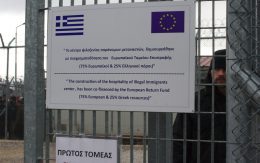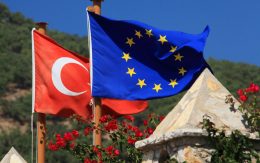This analysis is the sixth and last article of a six-part series on the Eastern Mediterranean, which provides an overview of the “problematic triangle between Turkey, Cyprus and Greece, in order to establish an understanding of the current events unfolding in the region. The other parts of this series deal with the historical background, the socio-economic challenges, the Arab Uprising, the Syrian Civil War, and the Israel-Palestine conflict from 2000-2020.
While the entrance of the 21st century signalized a shift from a preexisting unpredictability to a new period of stability for the rest of the international system, a similar development did not occur in the Eastern Mediterranean. As Florence Gaub perfectly summarizes, “[the] Eastern Mediterranean is currently at the epicentre of regional upheaval; the last five years have unfolded in the most unpredictable manner, which raises concerns about the five years to come” (ELIAMEP, 2016: 21). Over the last decades, the region has been the stage of large-scale phenomena accompanied by high political unrest, degradation of socio-economic conditions, and the rise of violence. These shifts have created new security threats, proxy wars, and domestic conflicts that have challenged not only the regional authorities but also the international community. Furthermore, the previously existing “status quo” among the states has been disrupted either by expansionist policies of some political leaders and regional conflicts, or the influence of third states and superpowers. However, what renders the situation in the region especially volatile is the interaction and the deep historical roots of the majority of the regional issues. The combination of these factors constitutes their resolution particularly difficult, hence contributing negatively to their persistence and intensification.
After the presentation of the historical background of the Eastern Mediterranean states, the forthcoming parts aim to present the issues and events that have determined the development of the region in the last twenty years. Contrary to the first part, the analyses of the following articles do not focus on the states, but instead, attempt to shed a light on the present numerous, and complicated issues that the region is confronted with. The rationale behind this decision is that contemporary matters and challenges have transcended the national borders, thus rendering a state-centric study limited and narrow. For this reason, the following articles in this series briefly examine a) the socio-economic background evolution of the region, b) the 2010/11 Arab Spring; c) the ongoing Syrian Civil War; d) the Israel-Palestine conflict in the last twenty years; e) the competition of Cyprus and Greece with Turkey. While these are not the only issues the Eastern Mediterranean states are currently facing, they provide a good understanding of the current problems in the region and starting points for further research. This present analysis will unpack the “problematic” triangle: Turkey, Cyprus and Greece.
The “problematic” triangle: Turkey, Cyprus, and Greece
It is impossible to discuss the Eastern Mediterranean without mentioning the second “cold” conflict (following the Israeli-Palestinian dispute) that has characterized the region, namely the Greek-Turkish longstanding dispute. Confined by history (wars between the Ottomans and the Byzantines, Ottoman occupation of Greece, irredentist wars in the 19th and early 20th century) and by more recent quarrels mostly in the Aegean Sea and the Cyprus case, the two states have traditionally undermined each other’s regional and international policies, even though they are both NATO members. Yet, a series of crises, specifically the Imia (1996), S-300 (1997-98), and Ocalan (1999) did not hinder the endeavour of the Greek and Turkish leadership making “baby steps” towards reconciliation in the 1990s (Siegel, 2002). For instance, by utilizing Turkey’s goal to join the EU, in 1995, Greece lifted its veto towards the EU-Turkey Customs Union agreement on the ground that it would open the accession negotiations between the EU and Cyprus in 1998. Furthermore, an important contribution in this pacification was also the domestic changes (liberalization, modernization, and Europeanization in domestic politics and the economy) that the two countries experienced in that decade (Keridis, 1999). Undoubtedly, the culmination point was the 1999 Helsinki Summit in Greece, when the latter advocated for Turkey’s EU membership. However, considering the current situation, one starts to wonder when things started to “go south”.
The background behind the “cold conflict” and Turkish Neo-Ottomanism
Several scholars consider the election of the Justice and Development Party (AKP) as the breaking point in the Greek-Turkish relations, but a closer examination shows that this is not exactly the case. Even though the AKP government (being a party with an evident political Islam core) prioritized economic and political links with selected Middle Eastern countries and other emerging powers, the support of Athens to Ankara’s EU membership effort did not diminish in the first decade of the 21st century (Keridis, 1999). However, what this analysis considers as the snapping point in the bilateral ties of the two states is the failed July 2016 coup in Turkey, when the Greek Supreme Court rejected the extradition of eight Turkish officers that sought refuge in Greece (BBC, 2016). Specifically, the 2016 Turkish coup d’état was an operation carried out by a faction within the Turkish Armed Forces that organized itself as the Peace at Home Council and linked itself to the Gulen movement. Although being unsuccessful, its impact has been significant on the Turkish domestic “front”. By highlighting Gulen and US involvement, Erdogan’s regime begun a series of purges against his supporters, which were painted in the national media as both traitors and security threats (Altinordu, 2017). Apart from that, Erdogan has been no stranger to utilizing the coup to create a threat narrative, and thereafter, propose the adoption of more authoritarian legal measures and practices (Coşkun, 2020).
Considering thus Erdogan’s persecution of “goulenists”, it is no surprise that the Turkish President perceived it as a direct challenge stemming from the Greek government. In fact, for many scholars, it constitutes a turning point for Turkey’s approach to not only the Middle East and the Eastern Mediterranean but also the West. Apart from the coup, there also other factors that have contributed to the decline: the emergence of Turkish Neo-Ottomanism, the discovery of energy deposits in the Eastern Mediterranean, and the escalation of existing issues such as the Aegean dispute and the Cyprus case. Starting from Neo-Ottomanism, it is a term used to describe the growing imperialist tendencies of Turkey within regions formerly under the rule of the Ottoman Empire, and the political ideology supporting this goal of revitalizing the empire in the modern context of Erdogan’s regime (Sengupta, 2014). The ideological and historical roots of this phenomenon are numerous and since its emergence, it has taken different manifestations. For instance, Erdogan’s has targeted not only the role of the West in the region and portrayed it as another “post-colonialism” but also the westernized Kemalism. However, the major example of Turkish Neo-Ottomanism is the Turkish policies in Syria after the eruption of the civil war, which is an issue closely connected with the Kurdish problem. About the latter, when the scenario of a possible Kurdish state became more tangible (as a result of events of the Syrian Civil War), the Turkish state did not hesitate to launch four military intrusions from 2016 to 2020 in order to not let it happen. Furthermore, having established itself in northern Syria, Erdogan’s regime has sought a more active regional role by positioning itself both as a natural heir and the sole protector of political Islam. The best example is Turkish involvement in Libya, where Erdogan sought to stabilize the situation with military means. Yet, contrary to Nasserism and his Pan-Arabism, Erdogan’s effort did not find a fruitful ground but instead brought him to a bigger conflict with the US, the EU, Russia (e.g., the 2015 Russian Sukhoi Su-24 shootdown), and other regional actors such as Syria (Angliţoiu, 2020).
The current state of Greek, Turkish, and Cyprian relations
Considering the above developments, the recent escalation with Greece should be perceived in the context of growing Neo-Ottomanism. Still, other regional developments also played an important part in the gradual deterioration of the bilateral relations between Greece-Cyprus and Turkey. A good point to start with is the refugee crisis in 2015 that combined with the continuous migration flows (with different levels of intensity and success) have contributed to the hostility between the two sides (Zachariadis, 2016). While both sides have been faced with internal issues (ranging from settlement problems to the rise of the far-right discourse and ideologies), the politicization of the phenomena has been the main “bone of contention”. For example, in 2016, Erdogan threatened again to open the doors for all the migrants and refugees to enter the EU to release the latter’s critique of domestic human rights violations (Deutsche Welle, 2016). Nonetheless, despite the prolongation of the issues, Greece, Cyprus, and the EU have failed to tackle Turkey’s provocation, thus allowing it to continue these practices and rhetoric.
Apart from that, there has been increased competition between the two sides following the discovery of hydrocarbons in the territorial waters and the EEZ of Cyprus. Following the uncovering of the Leviathan (Israel) and Zohr (Egypt) gas fields in the last decade, the region has attracted the attention of the EU and many foreign investors, thus becoming a battleground among the main players. This development has prompted Israel, Greece, Cyprus, and Egypt have created a common front by signing an agreement in January 2020 to build a 1,900-km pipeline distributing natural gas to Europe, and bypassing Turkey, a decision that was not well received by the AKP government (Euractiv, 2020). This newly emerged geopolitical alliance contradicts Turkey’s ambitions to become the main regional energy hub, its maritime claims, and the aforesaid Neo-Ottoman goals. Apart from that, considering the economic difficulties and the overall deterioration of the Turkish economy, the prospectus of the loss of one of the biggest energy reserves, specially positioned in its sphere of influence, is not so really appealing. As a response to its neighbours’ moves, Ankara has sought to develop the Trans-Anatolian pipeline, which can deliver natural gas from Azerbaijan to Turkey and Europe, and has responded with the Blue Homeland Doctrine, which disregards the Greek islands’ territorial waters and continental shelf (Biresselioglu, 2019). Yet, while the Azerbaijani gas has proved to be not sufficient, it has led to confrontations with Greece and Cyprus.
It is important to remember that the “energy dispute” falls in the broader framework of the Aegean dispute and the Cyprus case. Specifically, Greece’s maritime claims are based on the Seville map, which provides every Greek island with maximum territorial waters (12 nautical miles) and EEZ (200 nautical miles). Not surprisingly this claim has not been accepted by Turkey, which is not a signatory to the United Nations Convention of the Continental Shelf (Sevilla map), and thus loses this legal resource (Gross, 2020). This has made the problem especially difficult to resolve as there is a lack of a common legal framework for the two states to resolve their disputes. Whereas they came closer to overcoming the tensions through a series of diplomatic measures (particularly to ease Turkey’s accession to the European Union) between 1998 and the early 2010s, the differences remained unresolved as Turkey has shut down the scenario of a resolution within the context of the International Court of Justice.
Within this context, Turkey’s Blue Homeland doctrine has made the situation even more complicated. Furthermore, the Turkish government signed a maritime agreement with the Government of National Accord in Libya, which actively dismisses the territorial waters and EEZ of Crete and is in violation of UNCLOS, of which Greece is a signatory. At the same time, Greece and Cyprus have signed agreements with Egypt and Italy and forged alliances with Spain, Malta, and most importantly France (Adar & Toygür, 2020). Contrary to the past, Greece and Cyprus are pushing for more active and independent policy in the region by utilizing the shifts in the status quo. France and Egypt are a good example as Greece and Cyprus took advantage of two developments: a) Cairo regards Turkish actions in the Eastern Mediterranean as a security threat as its supports opposing actors in Syria and Libya; b) France wants a more independent European foreign policy and has opposed to the change of power in Libya and the GNA, which Turkey supports.
Nonetheless, this never-ending “build-up” has resulted in the scale-up of the regional tensions and has set the basis for a future conflict. This became apparent in August 2020, when a Greek and a Turkish warship were involved in a mild collision during a standoff. Though this event did not lead to a full-blown quarrel among the three states, it still revealed that there are underlying problems in the Eastern Mediterranean that need to be addressed. In parallel, the collective memory, the difficult past, the threat narratives, the enemy images that dominate the discourse of these states and their officials combined with the foreign interventions have not contributed positively to the dissolution of the issues. Considering all the above, it is evident that even though there is a possibility of a reemergence of negotiations between the two sides, namely Greece-Cyprus and Turkey, the existing matters are so long-standing and the region so unstable, that this solution is just capable of addressing merely the surface of the hostilities.
Conclusion to the Introduction to the Eastern Mediterranean
Following the historic background in part one of this series, the consecutive five-parts have tackled a few of the major issues and occurrences that have characterized the development of the Eastern Mediterranean in the last twenty years. The arrival of the 21st century has seen both the rise of democratization and the fall of authoritarian regimes as a result of pan-Arabic human rights and political movements. However, a decade after the Arab Spring, the positive and negative nature of its aftermath is still being debated by scholars due to the lack of actual changes in some of the affected states. There is no denying that the Arab Spring resulted in the growth of mass violence, internal polarizations, conflicts, and civil wars. A prominent example is the Syrian Civil War, which has cost millions of lives and almost brought the EU to its knees with the mass migration it caused. Yet, during the interpretation of the consequences of the Arab Uprising, it is important to keep the dominant Western gaze in academia in mind as well as the historical and social context of the region. Apart from that, the relations among the triangle of Cyprus, Turkey, and Turkey have been progressively deteriorating. The combination of the rising ambitions of the AKP’s regime and its Neo-Ottomanism with a declining economy, the diminishment of the support of the Turkish people, the emergence of new hydrocarbon resources, and the long-standing hates and legal disputes with Greece and Cyprus have created an extremely volatile mix. When it comes to Israel-Palestine, it is a “front” that has experienced stagnation in the last two decades. Despite international efforts, the resolution of the conflict has not been achieved but instead, the situation has declined following the foreign interventions of Donald Trump.
The analysis also seeks to highlight a last interesting point, that is, the significance of the foreign interventions in the regions. Due to occidental perception and its growing importance (especially after the discovery of energy resources) of the region, there is no denying that it has drawn the attention of the big powers (such as the US, China, Russia, and the EU), which are fighting over regional influence. While in some instance external powers have or could have contributed positively to the stability of the region (for example, the EU could apply its normative power to coerce Turkey similarly to the US), in most cases the results have been quite the opposite as they have either prolonged the issue at stake or ignored entirely the systemic underlying pathologies (e.g., Libya in 2013, Syrian Civil War). Still, there is no denying that what is happening currently in the Eastern Mediterranean is highly problematic and the prospects do not look good. However, paradoxically, the intensification of the regional issues could result in more research and general interest in a region that has been ignored by both, academia and policymakers.









Be First to Comment